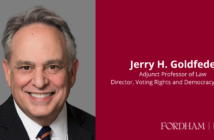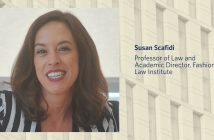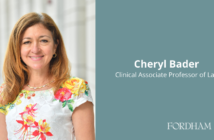Clare Huntington believes the law should do more to help a wide range of families flourish.
In 1979, Jonathan Lehr, the father of a little girl named Jessica, sought visitation and a declaration of paternity for his then 2-year-old. Lehr and Jessica’s mother had never been married, and her mother had recently married and was terminating Lehr’s parental rights so that her new husband could adopt her daughter. Lehr argued that, even though he had not supported his child financially, he had parental rights that were being disregarded. He lost.
The case made its way to the Supreme Court, where Justice Stevens affirmed the New York courts, finding that because Lehr had not supported his daughter financially or emotionally (he had admittedly not been very active in Jessica’s life) nor did he ever offer to marry Jessica’s mother, the adoption could proceed without his consent. In other words, Lehr’s actions were too little, too late.
While the opinion in Lehr v. Robertson is from 1983, the holding still stands as good law today. Fordham Law Professor Clare Huntington, while readily seeing the mother’s interest, contends that the case also reflects a narrow view of family life. In her scholarship, Huntington instead seeks to humanize and expand the scope of family law to provide, as she describes it in her 2014 groundbreaking book, Failure to Flourish, a place for families to thrive.
Many family law scholars have traditionally taken a narrow view of fatherhood, much like the Court did in Lehr; this rigid perspective is reflected in laws that, for example, prioritize the payment of child support over visitation rights. Huntington points out that these types of legal strictures are unnecessarily exclusive, particularly in a society where 40 percent of children are born to parents who are not, and may never, wed. Because traditional family law reinforces the nuclear family—the primary division in family law is whether someone is married or unmarried—the law denies opportunities to nurture all children, leaving many who are economically or otherwise disadvantaged in the dust. “A lot of family law doesn’t work for nonmarital families,” Huntington says, “partly because family law is built on the assumption that parents are married.”
Huntington eschews these easy assumptions. She stakes out new ground for all incarnations of the family. Solangel Maldonado, a professor of family law at Seton Hall University, describes Huntington as “one of a small number of scholars who recognize the contributions of fathers, even if the fathers are poor or have criminal records.” Elizabeth Scott, a family law professor at Columbia Law School, agrees that Huntington’s work “has expanded the frame to include unmarried fathers, a group that received little attention from earlier feminists and that has been relatively invisible in family law discourse.”
Through her work, Huntington reveals the gaps that leave certain family members in legal limbo. When parents are unmarried, she says, fathers are “treated as second-class citizens,” required to take steps to establish paternity and secure custody or visitation. While Huntington is clear that in some situations maternal custody is the right move, too often family law creates a legal quagmire ensnarling parents and their children: “What really matters for children is that they have stable and positive relationships. To the extent the law is making this harder, this can harm both the parent and the child.”
Huntington is poised to make a big mark on the field of family law, a field that for too long has been low-prestige, both in the academy and as a field of practice. With her extensive firsthand experience advocating for families and a robust body of scholarship marked by theoretical rigor, she hopes to reinvigorate the field with newer models, creating an inclusive space that humanizes the people it governs.
“I think conservatives claim a monopoly over the importance of families, but progressives can and should explain why strong families are essential to society,” she says, in a tone that is characteristically empathetic and also precise.
For the Children
An important element to Huntington’s work is the inclusion of not just scholars but also practitioners and advocates in many settings, including social work, psychology, education, and housing. Her focus on the practical side of the law stems from prior experience in international development and foster care. Both before and during college, Huntington gained experience in international aid, working in India and Senegal and studying international development at Oberlin College. During a six-month stay in Senegal, Huntington studied environmental issues and how problems like desertification were affecting families. “I had this international development experience and thought it would be my career,” she says.
But her work abroad inspired Huntington to return to America. “I saw so many issues, especially around poverty, and I wanted to work on them in the U.S.,” she explains.
She moved to New York City and shortly after began working as a caseworker for a foster care agency, where she worked with children who had been separated from their parents. It turned out that Huntington was working in the midst of the 1990s crack cocaine epidemic, when thousands of kids were being removed from their homes and often placed with members of their extended family. The job gave her a great deal of exposure to the law as she spent her time with families outside the court and with judges and lawyers inside the courtroom.
One of her most memorable cases involved a mother with five children, ranging from a pregnant 16-year-old to a newborn who was removed from the mother as soon as he was born. The mother was struggling with so many issues, from drug addiction to a violent relationship with the father of her youngest child. Working with people in the family law system forced Huntington to confront the symptoms of poverty. This, she said, led her to question the causes of poverty and ask how they could be addressed through structural changes. It also showed her the disproportionate presence of the law: “Every day, I saw the tremendous impact of the law on families, almost uniformly low-income and families of color.”
This early experience has greatly influenced Huntington’s approach to the law, which she describes as “humanist.” “When I was a caseworker, I wanted to keep children safe but also address the root causes of abuse and neglect,” she says. Huntington decided to attend law school, hoping that by looking at the law through the eyes of children and families, she could identify and address the needs of those who were the most vulnerable in society.
Once Huntington entered Columbia Law School, she found that she was in love with the law. “The law resonated with me as a way to think about entrenched societal problems,” she says. After law school, she completed three clerkships: with Denise Cote of the U.S. District Court for the Southern District of New York, with Merrick Garland of the U.S. Court of Appeals for the D.C. Circuit, and with Stephen Breyer and Harry Blackmun of the U.S. Supreme Court. While federal courts see few cases involving family law, Huntington says clerking was valuable because it gave her a different set of skills and refracted the law through “the most vulnerable and the most powerful.”
Both experiences also gave Huntington an unusual perspective for a legal scholar. As her colleague Maldonado says, “What’s fascinating is that you won’t find too many people who clerked for the Supreme Court who also were caseworkers.” This, she says, ultimately makes Huntington’s work accessible and rigorous.
Peer Family
Upon completing her Supreme Court clerkship, Huntington began working for the Office of Legal Counsel at the Department of Justice, a small office with an elite group of lawyers who work on constitutional law and complex statutory questions every day. It was there that she began working with Robin Lenhardt, who would become both a friend and Fordham Law colleague. Lenhardt says that the office at the time “attracted lots of young, dedicated lawyers who were very serious about the law and wanted to think deeply about the government and do work that mattered in the world.”
At the same time, Huntington kept one foot in family law by taking on pro bono cases, such as representing a father who sought visitation of his children but was unable to pay child support. “It was the perfect way to balance out the very high-level questions at the Office of Legal Counsel,” she says of her pro bono work. This also helped bond Huntington and Lenhardt together, says Lenhardt. “We were knit together by our commitment to justice before we became lawyers. We came to the law almost fully formed.”
After a few years, however, Huntington decided that it was time to get back to children and families, the individuals she cared most about. “I wanted to think closely and carefully about hard questions involving the legal regulation of families,” she says. She went into academia, first at the University of Colorado and then Fordham Law School. In 2015 she was appointed associate dean for research, and last year she was named Joseph M. McLaughlin Professor of Law. Despite her many administrative and teaching duties, Huntington remains in touch with the practice side of family law by consulting on cases and serving on task forces, such as one in Colorado that seeks to improve the representation of parents with children in foster care. She says the two aspects of the law fuel each other. “I love toggling back and forth between theory and practice,” she says.
Huntington cites her 2008 law review article “Repairing Family Law” as representative of her overall work as a researcher and attorney. In her work, Huntington emphasizes the need for family law to not just deal with the severing of bonds but also to nurture repair. Using the term “reparative model,” which she coined, Huntington focuses on the need for the law to help families forge new ways of relating to each other, even as legal relationships change.
Huntington continues the same project in her 2014 book, Failure to Flourish, where she addresses how family law can be used more positively to support families rather than to pull families apart, as the adversarial process so often does. She also focuses on the larger context of family life, asking whether zoning laws, transportation subsidies, and criminal justice policies make it easier or harder for parents to provide their children with the strong, stable, positive relationships they need. “My aim is to use the law to create a context where families can flourish,” she explains.
Close Relations
Influenced by her early experiences in family law, poverty law, and international development—and guided by her innate sense of what matters most to people on the ground—Huntington keeps her research relevant to the modern world by incorporating the work of scholars who study the intersection of law and other disciplines. “Clare’s research around the family is a direct line to the work she did as a younger person,” says Lenhardt.
Huntington, along with Lenhardt, organized a 2016 conference at Fordham Law School called “Moore Kinship,” where scholars met for two days in roundtable discussions to debate the limits and possibilities of the landmark Supreme Court decision in Moore v. East Cleveland, a ruling that has had a major impact on family law since the case was decided in 1977. During the conference, Huntington assisted with firming the link between the legal theory of family and the practical by inviting participants to discuss the relationship of family structure to issues such as food insecurity and housing. Lenhardt describes this as “the very material Clare is trying to bring into the conversation.”
One of Huntington’s goals is to spark debate across fields and inspire other academics and policymakers to consider the implications of their work for families. Maldonado describes Huntington’s work as “definitely interdisciplinary” by explaining “both how the law has the responsibility to help families flourish and how the law has hurt families.”
Huntington’s interdisciplinary approach is obvious in her latest academic work, which blends the social sciences, theory, and law seamlessly in a way that makes her ideas accessible and applicable to the challenges advocates, educators, and lawmakers face in the real world. For example, even as Huntington questions the law’s increasing reliance on empirical research, she is open to its use if employed judiciously. She advocates bringing in the interdisciplinary nature of child development studies and psychology to create better laws to target early childhood development, because young children’s needs are different from those of older children. Her written work pulls out needed principles of behavior before circling back to the dependence of young children on families for their emotional and physical well-being. With her insights into brain development, she brings the law into the fold as another way to discover what is best for children.
In light of today’s challenges, Huntington has set her sights on clarifying what family law can do and how empirical research can and should be used. She points to the Supreme Court decision in Obergefell v. Hodges as an instance where empirical research supported same-sex marriage. The case, she says, became a “battle of the experts.” But should empirical outcomes be the sole factor used to determine what family structures work for children? Huntington points to Native American families and argues that looking only at outcomes ignores the policies that destabilized tribes in the first place. Looking at family law requires examining the “historical and ongoing structural forces,” not just a focus on end results.
Huntington, as described by Lenhardt, also regularly shows her compassion for people from all backgrounds, which is what makes her body of work so notable. It would be one thing for her to talk about family law as an abstract concept, but it’s wholly another to bring people into the fold without making assumptions about morality. Lenhardt emphasizes that Huntington is “not just trying to change the discourse but also focus on the issues of poverty and inequality in ways that are both deeply theoretical and deeply humane and empathetic.” Maldonado also emphasized that Huntington is “inclusive and holistic.”
Huntington also examines the wider implications of family law, focusing not just on how the laws regulate familial interactions but also on how the laws can shape the family through outside forces. She credits her early training as a caseworker for these insights as well as for the need for academics to consider the role of poverty, which determines everything from school choice to housing to employment laws to the role of mass incarceration on the lives of children. While family law, as she says, has “an inverse relationship with prestige and importance,” the questions it asks are monumental, including which groups of individuals constitute a family, where a child lives, and how resources will be divided among family members and across society.
In her work as an associate reporter for the American Law Institute’s Restatement of the Law, Children and the Law project, Huntington drafts sections that deal with the very issues that she conducts her scholarly research on. The ALI’s stated focus is on the legal regulation of children—in families, schools, healthcare, and the juvenile justice system. It is a multiyear project in its third year. Her research focuses primarily on children in families, including issues such as the legality of corporal punishment, an area of family law that might seem deceptively simple. As Huntington is quick to point out, though, the issue raises profound questions of how to balance concern for children with a constitutional commitment to parental decision-making.
“The restatement isn’t about writing new laws but instead trying to summarize and encapsulate existing laws and their underlying justifications,” she says. Elizabeth Scott, who is the lead reporter on the ALI project, adds that Huntington’s work has “brought clarity and coherence to the law, in part by emphasizing the central principles that shape legal regulation in this area—protecting children’s health and welfare while respecting the privacy and autonomy of families and the diversity of parenting practices.”
Teaching at Fordham Law helps keep Huntington’s work fresh and inspiring. “Students bring a wide variety of experiences, both personal and professional, into the classroom,” she says. “Every student has a family, broadly defined, and so they come to family law with that experience.”
The challenge for students, she says, is to acknowledge personal experiences but then set them aside to think critically about the role of the state and the family, questions that have an impact on innumerable policies from transportation to child care to living wages. In her associate dean role, Huntington helps colleagues plan symposiums such as the Moore event, and Lenhardt describes her as a “generous and devoted colleague who puts a great deal of thinking and insight into projects like this.”
It is this idea of moving toward what the law is—and what it could be—that motivates the bulk of Huntington’s work. “Are we strengthening families and giving them what they need?” she asks. “How can we make life easier for parents? We all have a stake in supporting families.”




